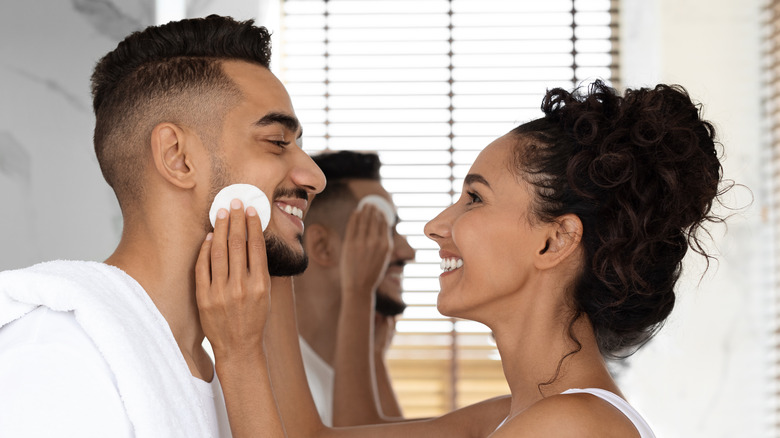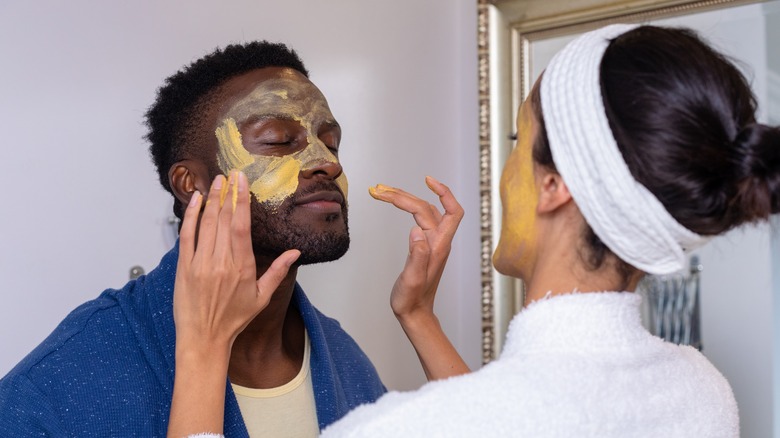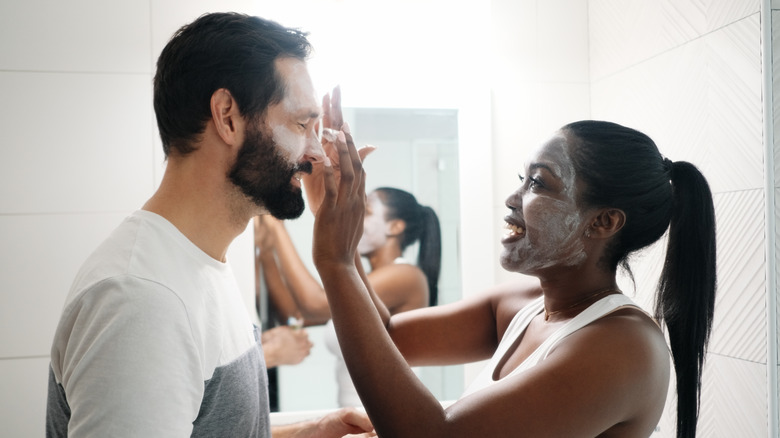Wait, Is There A Real Difference Between Men's And Women's Skin Care Other Than Packaging?
Most of us can spot men's skincare products a mile away. Usually, it's housed in a sad navy or gray package. There's also usually some unnecessarily intense phrase that vaguely gestures at extreme sports, like "endurance" or something daring and dangerous, like "Snake Peel." Seriously, Axe, we see you. Meanwhile, the absolute pageantry of women's skin care is half the fun. There's the chic minimalism of brands like Glossier or The Ordinary, the luxurious packaging from brands like Tatcha and Drunk Elephant, and the eye-catching aesthetic from brands like Glow. Each one delivers us the ingredients we all love in bottles that could double as decoration.
While it's fun to talk about the fun ways different labels entice us, the marketing around men's and women's skincare raises important questions about whether there's actually a real difference beyond the surface. Per Vox, in recent years, there's been a growing movement to call out brands for implementing a "pink tax" on products, or pricing based solely on the fact that something marketed toward women. Many male skincare products are cheaper, despite doing the exact same thing as women's products.
Still, most folks who are into specialized skincare routines know that choosing the right products is key. With that in mind, is there actually a difference between the content of men's and women's skincare? Does it matter if we mix and match? It turns out it does.
Women's skincare products have different key ingredients
In some cases with personal care products, the difference between the formulas of gendered products is minimal to nonexistent. SELF compared a women's branded shaving cream to one marketed toward men and found they had nearly identical ingredients, save for the fragrances. For this reason, most women can get away with using men's shaving cream just fine.
With skincare, however, things are different because the products cater more to serve specific skin concerns commonly exhibited by each gender. Stefanie Williams explained to Marie Claire, "Men's skin can tolerate a higher concentration of active anti-ageing ingredients such as retinol." As a result, their skincare products can sometimes be formulated with higher levels of these anti-aging actives. On the other hand, women's skin tends to be prone to dryness in adulthood, so products marketed toward them typically contain more moisturizing agents, like ceramides. Skincare.com points out that certain products marketed toward women also typically contain ingredients used to combat hormonal acne, like exfoliants.
Some people may benefit from products made for men or women
Although it probably won't hurt for a woman to use men's products short-term, depending on a person's their specific skincare goals, it may not be wise to do so forever.
Dermatologist Dr. Ted Lain explained to Skincare.com that different levels of hormones cause men's and women's skin to age at different rates. "The aging process is more gradual from a young age in men, whereas women's skin maintains thickness and moisture content consistently until menopause, when decreasing estrogen levels cause dramatic changes," he said. On top of this, men's skin typically contains larger oil glands, creating more natural moisture. The higher levels of testosterone in men means that their skin is tougher, thicker, and oilier, making them more prone to acne, so it's best to reach for products to combat that (Via Marie Claire).
On the other hand, Dermatologist Rachel Nazarian told the Wall Street Journal that the hormonal changes that impact women's skin means that there are a variety of ever-changing issues to deal with, from hormonal acne or dry patches on our faces. Dr. Nazarian explained that for these reasons, it's absolutely necessary to use different products.
Nevertheless, while some people can benefit from skincare designed specifically for men or women, at the end of the day, it shouldn't be the only factor guiding a person's routine. Healthline for instance, says it's better to choose products like cleansers based on your specific skin care needs rather than your gender.


